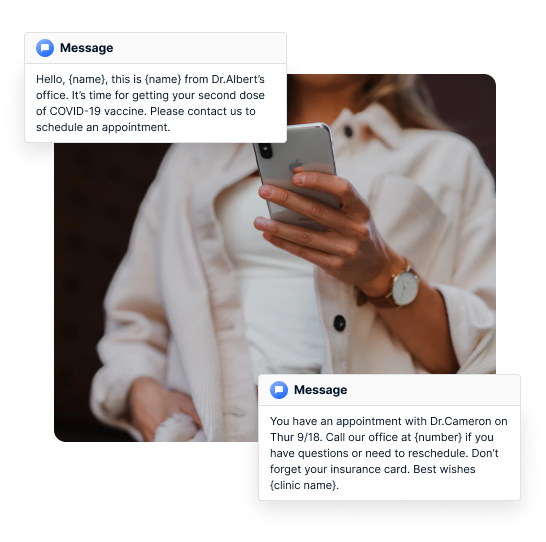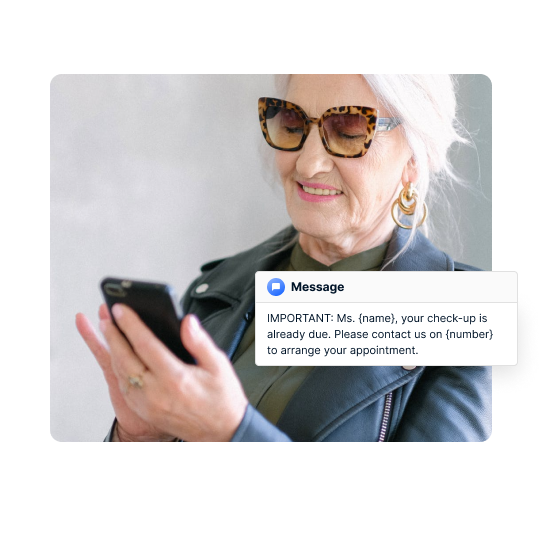- Products
- Solutions
SMS solution for healthcare industry


No-shows are frustrating but an inherent part of the medical practice. Patients who do not attend the planned appointments deplete services, waste doctor’s valuable time, and, perhaps above all, bring considerable cost implications. The stats are impressive: one patient survey conducted in spring 2020 in Ohio determined the no-show rate at over 36%, while a more recent study demonstrated up to 29.8% missed appointments in the USA, up to 12.1% in the UK, up to 24.6% in Canada, and dramatic 48.1% in Malaysia.
There are many reasons why patients miss their appointments. Some are conditioned by the patient’s situation, like a lack of time, heavy workload, or reluctance to wait in line. According to the most recent full-scale research from the Medical Group Management Association (MGMA), the simple forgetfulness to attend or cancel is the most common cause (52.4%). 28.6% of non-attenders reported that they wrote down the incorrect date or time, and 23.8% named transport or work issues as the reason. So, the efficacy of the appointment reminders is responsible for most of the nonattendance cases. Therefore, it is reasonable to implement a secure medical text messaging system to reduce those figures.
No question that the top priority for all medical institutions is patient care. But in real life, running a practice implies many other efforts — processing forms, staff management, interaction with insurance agencies, and, of course, appointment scheduling. That’s why today some medical reminder systems are a no-brainer across health facilities.
But prior to sending anything, you have to collect the recipients’ numbers and, in most scenarios, their opt-in. This is a crucial distinction between transactional and promotional text. The first is intended to facilitate, confirm or complete an interaction already agreed. Any other texts that aren’t directly related to an existing interaction require express written consent. Fortunately, appointment or checkup reminders belong to the first category.
However, even if you have a patient’s phone number on file, it’s easy and respectful to ask if they’d like to be reminded when you schedule an appointment. This is also the right time to ask if they don’t mind receiving other texts (e.g., weekly health advice, prompts to schedule next appointments, new services advertisements). Patients often feel anxious, and they can make mistakes while filling out their forms. That’s why it is reasonable to validate and verify mobile numbers ― to prevent sending SMS into the blue. If you allow scheduling visits online, add a sign-up form to your website. Or put a sign or placard in your waiting area, with simple instructions to sign up for your medical reminder service.
How can text messages prevent appointments missing?
Needless to say that we can’t control work troubles or traffic jams. However, you can deal with 81% of appointments ― forgotten or miscommunicated. Emails have a low open rate and are often trashed. Calls are intrusive and usually untimely. The preferable way to confirm the upcoming appointments is SMS.
Like educational institutions, public hospitals and clinics cannot afford to waste time and money on ineffective tactics. That’s the similarity between medical text messaging and text messaging service for schools: the notifications in both fields are sensitive and must not be ignored at all costs. Blasting automated reminders via a robust bulk SMS platform, such as WTC, improves attendance rates, ultimately saving time and cutting overhead. And if you integrate the WTC reminder software with your regular CRM, data from the latter, such as names, appointment dates, and times, can be pulled in automatically via our well-documented API.
But what makes SMS so useful for no-shows prevention? To begin with, people do read them instantly, to be exact ― within three minutes after arrival. To do that, they neither need an app, nor Internet access. There’s no junk folder for short messages and no mute option. Texting is friendly and conversational by its nature. Patients check SMS even if they’re not available for a call, and they can comfortably refer to them back later.
It is notably easy to set up automated patient reminders with WTC ― only basic client data and the URL for appointments are required. You can specify when to dispatch your messages, up to months ahead. Sending will run in the background allowing you to focus on your patients. And the relatively low price per message combined with impressive ROI due to reduction in did-not-attend rates makes the SMS reminder system a truly cost-effective channel.
To pave the way for the success of your text messaging appointment reminders, pursue the following criteria:
- launch hospital text messages between 12 pm and 5 pm;
- tell patients not to forget to bring their insurance certificate, medical record, and other required paperwork;
- keep automated appointment reminder concise and readable;
- include the appointment date, time, and location.
We already know that no-shows often happen because people write down the wrong time. Thus, it’s essential that your medical alert contain all appointment details. But remember: text messages as such do not comply with the Health Insurance Portability and Accountability Act (HIPAA). Each SMS medical alert is stored for an unlimited time on the mobile operators’ servers. Moreover, if a phone is stolen or lost, personal health data might be exposed. To prevent that, the practitioner’s specialty, the appointment reason, the treatment to come for, the medicine to take must not be included in text message reminders for medical appointments.
You can pare down the large number of patients who merely forgot to cancel by asking them to confirm appointments by replying to you.
Text message reminders samples for medical appointments
Below are a few ways how healthcare appointment reminder text messages can keep your patients pleased, employees useful, and revenue in good health.
Hello, {name}, this is {name} from Dr.Albert’s office. It’s time for getting your second dose of COVID-19 vaccine. Please contact us to schedule an appointment.
You have an appointment with Dr.Cameron on Thur 9/18. Call our office at {number} if you have questions or need to reschedule. Don’t forget your insurance card. Best wishes {clinic name}.
IMPORTANT: Ms. {name}, your check-up is already due. Please contact us on {number} to arrange your appointment.
